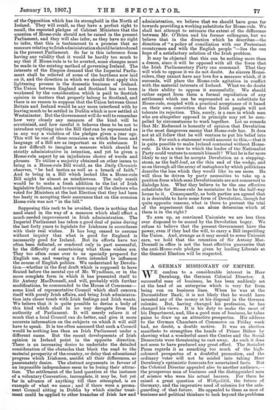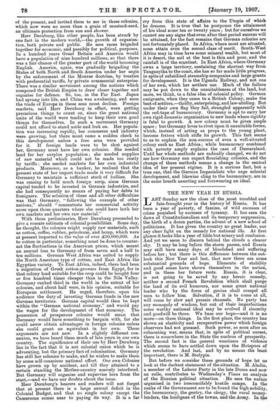A GERMAN MISSIONARY OF EMPIRE.
WE confess to a considerable interest in Herr Dernburg, the German Colonial Director. A successful man of business, he has been suddenly set at the head of an enterprise which is very far from being run on business lines. When he was at the Darmsthdter Bank; it is not likely that he would have invested any of the money at his disposal in the German colonies. But, having changed his profession, he has changed his views. It is his duty to make the most of his Department, and, like a good man of business, he takes pains to draw up an attractive prospectus. His address to the German Chambers of Commerce on Friday week had, no doubt, a double motive. It was an election manifesto to strengthen the hands of Prince Billow by showing what a wonderful asset the Centre and the Social Democrats were threatening to cast away. As such it does not seem to have produced any great effect. The Socialist Press regards it as smacking too much of the high- coloured prospectus of a doubtful promotion, and the ordinary voter will not be misled into taking Herr Dernburg's optimistic forecasts for ascertained facts. But the Colonial Director appealed also to another audience,— the prosperous men of business and the distinguished men of science who were his actual hearers. For them he raised a great question of Weltpolitik, the future of Germany, and the imperative need of colonies for the safe- guarding of that future. He appealed to them as men of business and political thinkers to look beyond the problems
of the present, and invited them to see in those colonies, which now were no more than a grain of mustard-seed, an ultimate protection from sun and shower.
Herr Dernburg, like other people, has been struck by one fact in the modern world,—the growth of organisa- tion, both private and public. He sees races brigaded together for economic, and possibly for political, purposes. In a hundred years Great Britain and America would have a population of nine hundred millions, so that there was a fair chance of the greater part of the world becoming English. America, again, was gradually brigading the States of both North and South America under her aegis by the enforcement of the Monroe doctrine, by treaties with preferential tariffs, by private commercial enterprise. There was a similar movement among the nations which composed the British Empire to draw closer together and organise for defence. So, too, in the Far East. Japan had sprung into life, and China was awakening, and soon the trade of Europe in those seas must decline. Foreign markets, said Herr Dernburg in effect, were getting precarious things to count on, since the great national units of the world were tending to keep their own good things for themselves. In such a movement Germany could not afford to stand aside and look on. Her popula- tion was increasing rapidly, her commerce and industry were growing, but there must come a sudden check to this development unless a free area were provided for it. If foreign lands were to be shut against her, Germany must have her own colonies. She needed land for her surplus population ; she needed supplies of raw material which could not be made too costly by tariffs ; she needed markets for her own industrial products. Moreover, as a banker, he realised that the present state of her import trade made it very difficult for Germany to maintain a sufficient stock of bullion. She was ceasing to hold much foreign scrip, since German capital tended to be invested in German industries, and she had consequently no means of paying her debts to foreigners. The solution of these and all other difficulties was that Germany, "following the example of other nations," should " concentrate her commercial activity more upon those quarters where she could have both her own markets and her own raw material." With these preliminaries, Herr Dernburg proceeded to give a roseate estimate of colonial possibilities. Some day, be thought, the colonies might supply raw materials, such as cotton, coffee, rubber, petroleum, and hemp, which were at present imported to the value of over £50,000,000. As to cotton in particular, something must be done to counter- act the fluctuations in the American prices, which meant an annual loss to Germany of from seven and a half to ten millions. German West Africa was suited to supply the North American type of cotton, and East Africa the Egyptian variety. To East Africa, indeed, there had been a migration of Greek cotton-growers from Egypt, for in that colony land suitable for the crop could be bought four or five hundred times cheaper than in the Nile Valley. Germany ranked third in the world in the extent of her colonies, and about half were, in his opinion, suitable for European settlement. He urged, therefore, upon his audience the duty of investing German funds in the new German territories. German capital would then be kept within the "German national economy," and would pay the wages for the development of that economy. The possession of prosperous colonies would mean that Germany would have something to bargain with, for she could never obtain advantages in foreign colonies unless she could grant an equivalent in her own. These arguments are not new. In a slightly different con- nexion, we have heard them much of late years in our own country. The significance of their use by Herr Dernburg lies in the fact that it is not colonial union which he is advocating, but the primary fact of colonisation. Germany has still her colonies to make, and he wishes to make them by some self-conscious national effort. Our own Colonies have grown up by accident, and till they attained to a certain standing the Mother-country scarcely interfered. But Germany, will organise and supervise hers from the start,—and we have our doubts about the issue. Herr Demburg's hearers and readers will not forget that at. present there is a large annual deficit in the Colonial. Budget, and that no single colony except the Cameroon comes near to paying its way. It is a far cry from this state of affairs to the Utopia of which he dreams. It is true that he postpones the attainment of his ideal some ten or twenty years ; but forourselves we cannot see any.signs that even after that period success will be attained, for the fact remains that German colonies are not fortunately placed. In Africa, where most are pituated, none attain even the second class of merit. South-West Africa may in time have some mineral wealth, but most of it is desert, the soil at the best is thin and poor, and the rainfall is of the scantiest. In East Africa, where Germany owns a large territory, containing the shortest way from Tanganyika to the coast, she has so far made little progress, in spite of subsidised steamship companies and large grants for development. It is the Uganda Railway, and not one of her own, which her settlers use. Much of the failure may be put down to the unsuitableness of the land, but more, we think, to a false idea of colonial policy. German emigrants, when they come to a British Colony, make the best of settlers,—thrifty, enterprising, and law-abiding. But under their own flag they fail, strangled apparently with the red-tape of bureaucracy. Germany is apt to carry her own rigid domestic organisation to new lands where rigidity is fatal to growth. A new colony must be given ample space ; but Germany loves to rivet upon it unsuitable forms, which, instead of acting as props to the young plant, become fetters which stifle its growth. This fact seems to us to explain the non-success of even a well-situated colony such as East Africa; while bureaucracy combined with poverty amply explains the case of Damaraland. Until her whole methods are radically changed, we do not see how Germany can expect flourishing colonies, and the change of these methods means a change in the central idea of her present regime. It is a curious fact, but a true one, that the German Imperialists who urge colonial development, and likewise cling to the bureaucracy, are in the same breath asserting and forswearing an ideal.







































 Previous page
Previous page